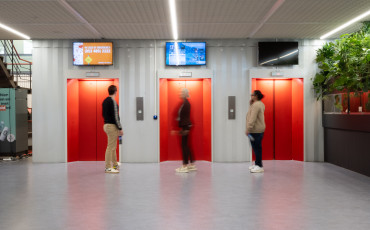Franka van de Wijdeven
Als communicatieadviseur bij het Expertisecentrum Inclusief Onderwijs… Meer over Franka van de Wijdeven
In this topic, you'll find information about inclusive education. This concerns making education suitable for students with a functional disability, for example, a visual or hearing impairment. We also refer to information on how to prevent vulnerable students from getting disconnected or falling behind, such as students who don't have a quiet workplace, don't have a laptop, or who are in a different time zone.
The information on this page is not exhaustive, however, we refer to the most important articles on the Community. We provide links to useful information and tips. When we receive information, articles, or sources with tips or tricks on our email address, VraagbaakOnlineOnderwijs@surf.nl, we'll add it here as soon as possible. Please, feel free to send us your information.
If you'd like to ask colleagues in the sector questions, or would like to discuss something with others in the industry, go to the forum and post your question. You can also respond to other people's questions. You can log on with your institutional account to join the forum.
Inclusivity is always an important theme in education. However, in rushing towards online education, due to the pandemic, attention to accessibility and inclusivity might fall behind. As a result, the inequalities between students may increase and may cause some students (with or without a disability) to lag behind. This interesting article from the US talks about how accessibility is suffering under the crisis. This NY Times article shows how closing the physical doors on campus increases student inequality. But the theme of inequality also lives in The Netherlands. Utrecht University, for example, has launched a crowdfunding campaign to help students who are in financial distress due to the Corona crisis.
Educational institutions are legally obliged to provide digital access to their students (read more about the Dutch legal frameworks here), including students with a functional disability. In this article about digital accessibility (Dutch), we have listed some tips to improve digital access.
In addition, the Diversity Office of Leiden University, in collaboration with internal experts, has drawn up a guideline for accessible digital education and made it available to us. You can download the English version here.
More tips on inclusive publishing specifically can be found in the publications 'Open up' and 'Get involved!' (Dutch) from the Dedicon foundation, with practical tips for making material accessible.
If you are a professional in higher education and you have questions about studying with a disability, you can also contact the ECIO information line.
Recently, attention has also been paid to inclusive remote education by ScienceGuide. In this article (Dutch), two employees of the Expertise Centre for Inclusive Education (ECIO) and a student speaking from personal experience state that extra guidance and adjustments for students with a disability during the corona crisis are not a luxury, but a necessity. The article also contains practical tips, such as options for accessibility while using Mircosoft Office and Apple and features like live captions in Zoom and MS Teams.
With the advent of the corona pandemic, many international students moved back to their home countries. This situation adds new challenges to the international classroom: students may be in different time zones, which complicates class and exam scheduling for the teachers and makes attendance to live virtual classes and online exams difficult for the students. One tip would therefore be to encourage asynchronous over synchronous forms of remote teaching. Another would be to record the lectures, so that students who can’t attend the live virtual classes can still benefit from watching them in their own time.
While many of the tips for making education inclusive apply to the international classroom as well – think of issues of access such as lack of a quiet place to study or having no laptop – the international classroom also knows its own challenges in times of corona. For example, whereas most students in the Netherlands will have access to relatively stable internet connection, this may not be the case for international students at home, who may have poor or very expensive access to the internet.
One way of ensuring your international classroom feels safe and inclusive is by asking students about their learning needs and experiences in these difficult times. This twitter thread offers a good example of a simple survey that was put out prior to classes moving online, to get a sense of students’ access to technology and of their concerns. Knowing which concerns students have and what their learning needs are can then be used for successful (re)designing of courses for inclusive remote learning and teaching.
Last updated by Yvonne Florissen, 1 May, 2020, 5:15 PM
Als communicatieadviseur bij het Expertisecentrum Inclusief Onderwijs… Meer over Franka van de Wijdeven



0 Praat mee